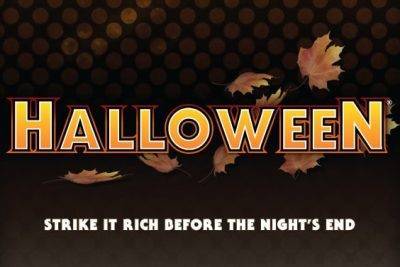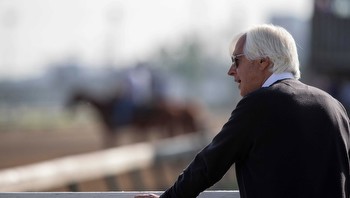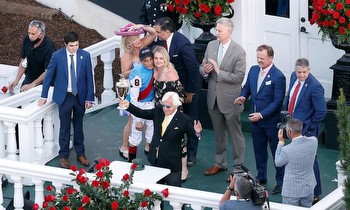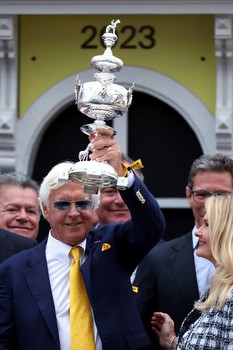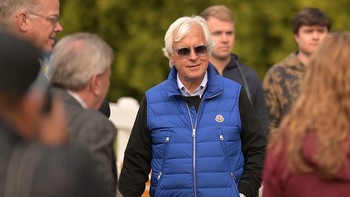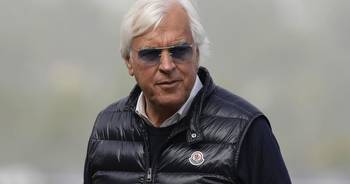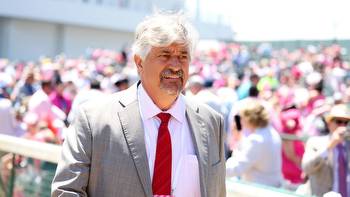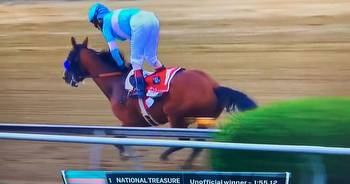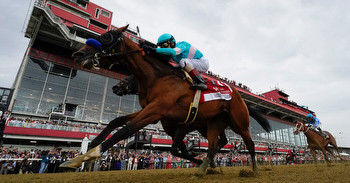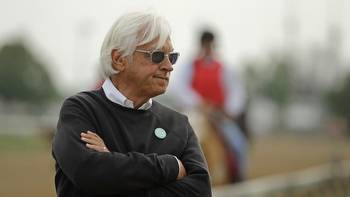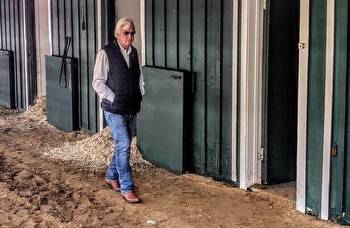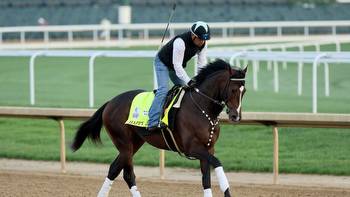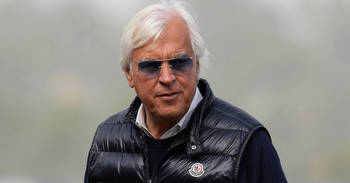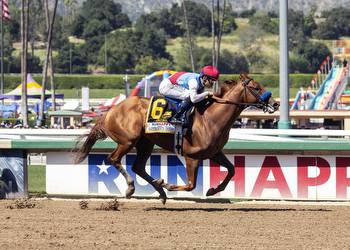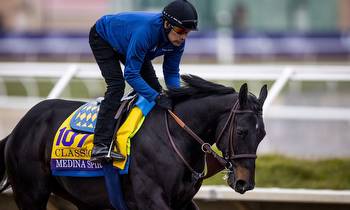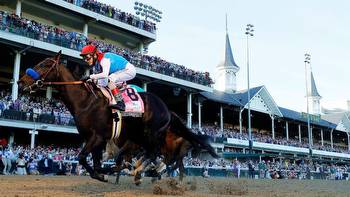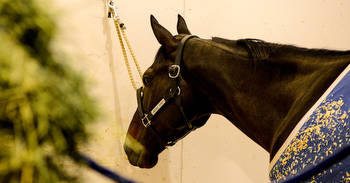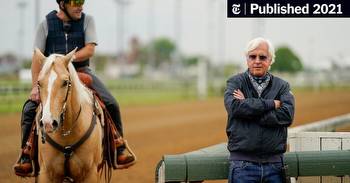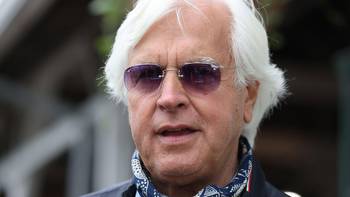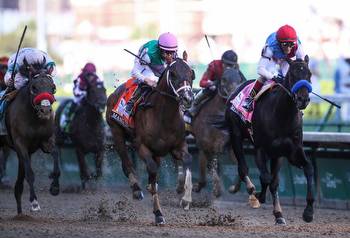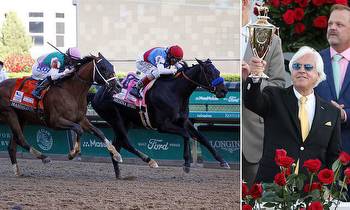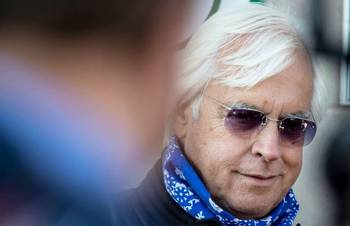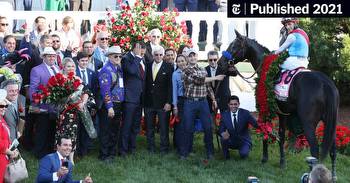Even in Exile, Bob Baffert Is the King of the Sport of Kings
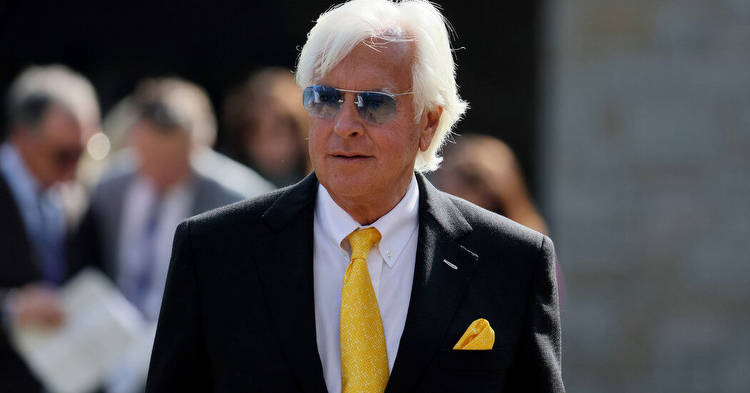
ARCADIA, Calif.— As exiles go, Bob Baffert’s has been a comfortable one. Most mornings, the horse trainer who is barred from competing in the Kentucky Derby, can be found beneath the rouge-tipped San Gabriel Mountains, holding court at Clockers’ Corner, the open-air bistro at Santa Anita Park.
Hands shoved in pockets on a recent morning, he talked basketball with a cluster of jockey agents and horse owners before shuffling on toward the eighth pole to watch his horses work. Once there, Baffert lifted his binoculars to study his Light Brigade like a jeweler sizing up uncut gems.
The horses in the Baffert barn are the most expensive in Southern California, if not the world. One of the owners he works for, Amr Zedan, paid $3.55 million at auction for a colt named Hejazi and $2.3 million for another, Arabian Knight.
If the name sounds familiar, it should: Zedan, a Saudi venture capitalist, owned Medina Spirit, who won the 2021 Kentucky Derby until he didn’t. The colt tested positive for a prohibited drug on race day and had his victory rescinded. Then Baffert was suspended for 90 days by Kentucky regulators and barred by Churchill Downs, the host of the Derby, from saddling horses in the race in 2022 and 2023. Maryland and New York regulators honored the ban in 2022, so Baffert also missed the other two legs of the Triple Crown, the Belmont and the Preakness.
The affair further damaged a perpetually troubled sport, resurrecting concerns about doping scandals, the frequent and mysterious deaths of its horses (Medina Spirit died suddenly in 2021 while training) and waning interest in racing.
After initially blaming “cancel culture” for his shunning, Baffert vigorously proclaimed his innocence and has unsuccessfully tried to get his punishments overturned in courthouses and committee hearing rooms from Kentucky to New York.
One place he was clearly not canceled was Southern California. In 2022, Baffert’s stable won all but a handful of its 75 races at Santa Anita, Del Mar and Los Alamitos, amassing more than $9.7 million in purse earnings to finish 12th in the national trainer standings, according to Equibase, despite Baffert missing three months while serving his suspension.
On a recent morning, a cheerful Baffert indicated that he wanted to turn the page and talk about his hopes of returning to the Triple Crown trail at the Preakness in Baltimore in May. He had just returned from a 2-year-old in training sale in Ocala, Fla., where Zedan spent $2 million for a colt, adding another high-profile prospect to the Baffert barn for the 2024 Derby.
Within an hour, however, his lawyer, Clark Brewster, said Baffert would agree to an interview only if it centered on a 15-slide Power Point presentation of legal arguments that he said showed Baffert had not broken the rules and should not have lost his 2021 Derby win.
In affidavits, Baffert has said that by barring him from the Derby and any other racetrack it owns, Churchill Downs would “effectively put him out of business.” That has not happened because, whatever his missteps, horse owners continue to trust him with their investments and their confidence in him keeps paying off.
The horse owners Baffert works with buy the best bred and most athletic colts at the auctions, then turn them over to him in the hopes of winning the American classics — the Derby, Preakness and Belmont Stakes — which, along with the Breeders’ Cup races, enhance a horse’s value as a stallion prospect.
Baffert has trained 16 classic winners, 18 Breeders’ Cup champions and two colts — American Pharoah (2015) and Justify (2018) — that swept the Triple Crown. The Irish-owned Coolmore breeding concern bought American Pharoah for $30 million and Justify for $60 million.
Baffert has been effusive about his love for the Derby, approaching it with the same intensity with which Steve Kerr and Bill Belichick chase N.B.A. and N.F.L. championships. His six official Derby victories tie Ben Jones, who captured his between 1938 and 1952, for the most by a trainer.
In a February court proceeding to have the Churchill Downs ban lifted, Baffert was asked how many times he had won America’s most famous race.
“Seven,” he replied, still counting Medina Spirit’s erased victory. “I broke the record. I’m very proud of that.”
Baffert was a quarter horse trainer in the late 1980s when Mike Pegram, a longtime horse owner, urged him to switch to thoroughbreds. By 1998, the pair had won the Derby, the Preakness and then missed the Triple Crown by a diminishing nose in the Belmont with a colt named Real Quiet. Both had found the stage that they wanted to play on.
Pegram said the stress of Medina Spirit’s failed drug test and its aftermath may not be reflected in the performances of Baffert’s horses or in the prices his owners pay at auction, but it has taken its toll on Baffert and his reputation.
“The numbers are the numbers, and they show Bob’s the best there is,” Pegram said. “But if someone attacks you personally it hurts. Everybody handles it differently. Bob’s a big boy and is moving on.”
Maybe so, but Baffert continues to fight to overturn the disqualification of Medina Spirit, his own suspensions in Kentucky and New York and his prohibition from Churchill Downs-owned tracks. He has said that the substance detected in Medina Spirit’s blood — betamethasone, a corticosteroid injected into joints to reduce pain and swelling — came from an ointment rather than an injection.
Lawyers for state regulators and Churchill Downs counter that the drug is prohibited in any amount on race day and point to nine positive drug tests Baffert’s horses amassed from 2016 to 2020 to argue that his participation is detrimental to horse racing.
“They’ve hurt my reputation,” Baffert testified in federal court in February. “My horses should’ve made much more money. I didn’t run for 90 days, and I had to let people go.”
Shortly after the ban was imposed, Baffert handed off most of his Derby contenders to other trainers, mainly the former assistant Tim Yakteen, so they could earn points to qualify for the Derby in the final prep races. Last year, Yakteen saddled Taiba and Messier for Baffert and watched them finish 12th and 15th.
Pegram left his horses in Baffert’s barn, effectively opting out of the Derby. One of them, Cave Rock, finished second in the 2022 Breeders’ Cup Juvenile to Forte, the 2-year-old champion and current favorite to win the Derby. Cave Rock is among the horses Baffert is considering taking to Baltimore for the Preakness.
“Bob’s got character and I hope I got some character, too,” Pegram said.
California has been good for Baffert, but it is not as clear that he has been good for horse racing in the state. The sport was badly rocked in 2019 after 30 horses died at Santa Anita in a span of six months, national news that earned the scrutiny of California lawmakers and animal rights activists.
In response, state and racing officials strengthened regulations around the use of riding crops, medication for horses, education for trainers and jockeys, track safety and recuperation policies for injured horses. Last year, 12 horses died at Santa Anita, and thoroughbred fatalities throughout California fell 54 percent from 144 in 2019 to 66 for the last fiscal year.
Even so, Baffert’s Derby disqualification and the death of Medina Spirit kept horse racing in an unflattering light in a state where animal rights groups have a powerful voice.
Baffert’s upcoming return to Triple Crown races coincides with stricter drug rules going into effect. They will be administered by the newly minted Horseracing Integrity and Safety Authority, which appears to have survived court challenges by racing industry groups. Drug testing now will be centralized, fast and efficient.
That was not the case when Medina Spirit failed his postrace drug test. If the new rules had been in place then, Medina Spirit might have been kept out of the Derby starting gate because Baffert would have been serving at least a 180-day suspension, and most likely more, for previous infractions, according to the baseline rules.
Within the horse racing community, Baffert’s dominance in California is acutely felt among fellow trainers and owners. Fourteen of the 16 horses nominated for the $200,000 Robert B. Lewis Stakes, an important race on the road to the Derby, were trained by Baffert. Together, his owners had paid $9.1 million for them.
On race day, only four horses made it to the starting gate — and Baffert trained all four of them. Bettors were apoplectic and regulators concerned that a single trainer could control the outcome of the race. Scott Chaney, the executive director of the California Horse Racing Board, said officials warned the jockeys against working together.
“We don’t want any, like even a hint of colluding with each other because that’s where it is a regulatory issue,” Chaney said in an interview.
The competitive imbalance has made for a tense dynamic on the backside at Santa Anita and Del Mar, the premier California track outside San Diego. Some owners have decided that if they can’t beat Baffert, they might as well join him, and have given him more horses for his already loaded barn. Fellow trainers grumbled but declined to go on the record so as not to look envious.
“No knock on Bob — he’s got a powerful brand, a good team and he delivers,” said Bill Nader, president and chief executive of the Thoroughbred Owners of California. “I think the frustration among trainers is ‘Why not me?’ It is a fair question. There’s no shortage of alternatives. We have Hall of Famers, big outfits and up-and-comers that all are excellent trainers and have won big races.”
There is a frequent lament among horseplayers that underlines the quixotic nature of a horse race: “Nobody knows nothing.”
Horses are expensive. Breeding means nothing unless a horse can run fast. Between injuries and poor performances, Baffert’s multimillion-dollar thundering herd has been winnowed to just one Derby qualifier — Reincarnate, handled by Yakteen.
And the Derby is anyone’s race. Ask Eric Reed and Sonny Leon, the trainer and jockey of Rich Strike, last year’s winner at 80-1.
You want a good bet? Baffert will saddle a colt in Baltimore at the Preakness, ending his Triple Crown exile and taking his place back on horse racing’s center stage.
